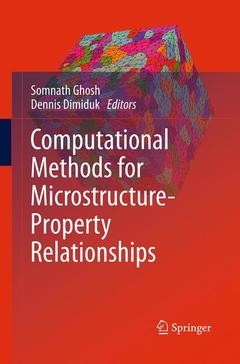Description
Computational Methods for Microstructure-Property Relationships, 2011
Coordinators: Ghosh Somnath, Dimiduk Dennis
Language: English
Publication date: 08-2016
Support: Print on demand
Publication date: 11-2010
658 p. · 15.5x23.5 cm · Hardback
Description
/li>Contents
/li>Comment
/li>
Computational Methods for Microstructure-Property Relationships introduces state-of-the-art advances in computational modeling approaches for materials structure-property relations. Written with an approach that recognizes the necessity of the engineering computational mechanics framework, this volume provides balanced treatment of heterogeneous materials structures within the microstructural and component scales. Encompassing both computational mechanics and computational materials science disciplines, this volume offers an analysis of the current techniques and selected topics important to industry researchers, such as deformation, creep and fatigue of primarily metallic materials.
Researchers, engineers and professionals involved with predicting performance and failure of materials will find Computational Methods for Microstructure-Property Relationships a valuable reference.
Introduction.- Methods for Generating 3D Image Data for Material Microstructures.- 3D Microstructure Simulation.- Microstructure-Based Domain Partitioning, RVE Definition and RVE Evolution for Intrinsic Property Computations.- Coupling Microstructure Evolution with Microstructure Characterization.- Materials Response Representations & Limitations in Present-day Design Codes.- Local Continuum Approaches to Constitutive Modeling.- Strain Gradient Plasticity; Dislocation Coarse-Graining Challenges; Representing Length-Scale Dependence.- Constitutive Laws for Time Dependent Thermally-Activated Processes.- Conventional Finite Element Methods.- Full-Field or Meshless and Homogenization Methods for Handling the RVE.- Limitations in Homogenization and Uncertainty.- Links to Fracture Mechanics & Probabilistic Methods.- Accelerated Time Scaling Methods for Fatigue Analysis.- Treating Challenges Below the Grain Scale.- Multiscale Methods for Material Modeling.- Representing Environmentally Induced Damage.- Emerging Methods for Matching Simulation and Experimental Scales.- Approaching Design Systems for the Future.
Covers materials modeling from the multiscale structural materials perspective – a dynamic and rapidly advancing area of research
Presents the current state of knowledge of a wide collection of research areas related to materials assessment in structural materials interaction
Brings focus to a frontier topic and provides the foundations for growth in the field
Includes supplementary material: sn.pub/extras




